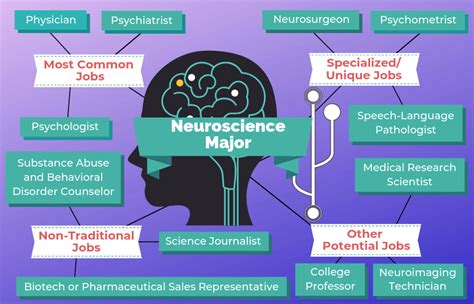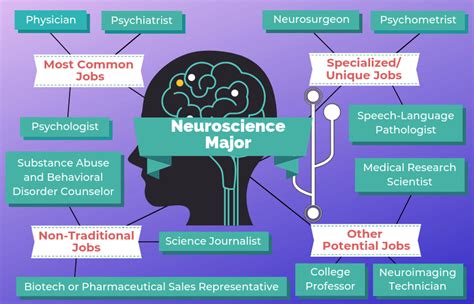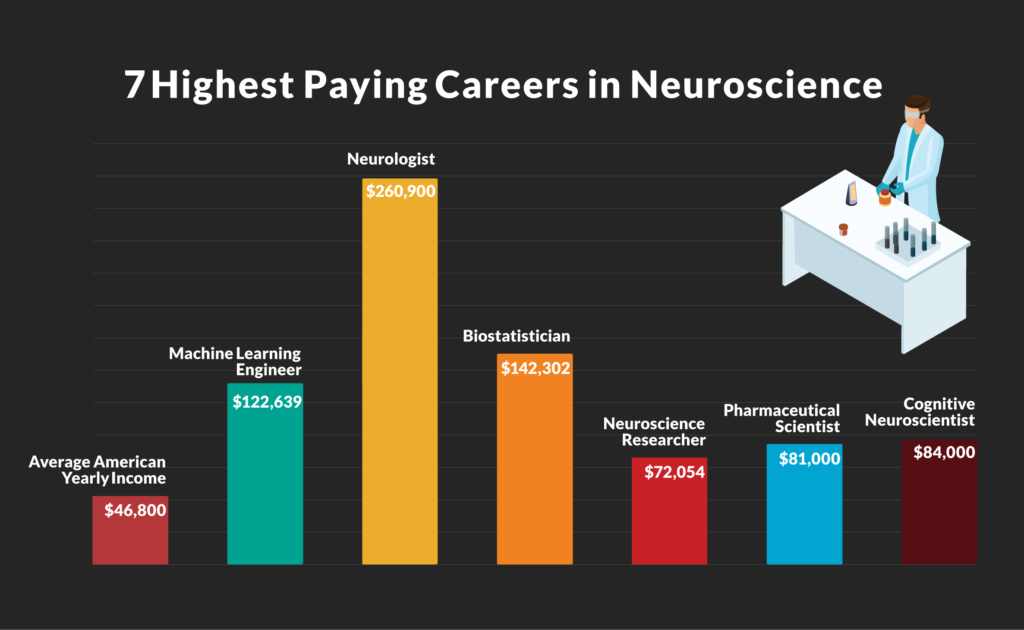Careers In Neuroscience

Neuroscience, the captivating field that explores the intricate workings of the brain and nervous system, has witnessed an incredible rise in popularity and interest in recent years. With advancements in technology and a growing understanding of the brain's complexity, neuroscience offers a plethora of career paths and opportunities for those intrigued by the mysteries of the mind.
In this comprehensive guide, we delve into the diverse career options within the realm of neuroscience, shedding light on the exciting paths available to aspiring scientists, researchers, and professionals. From unraveling the secrets of neural networks to developing innovative treatments for neurological disorders, the field of neuroscience offers a rich tapestry of opportunities to make a meaningful impact.
The Multifaceted World of Neuroscience Careers

The field of neuroscience is an expansive and diverse domain, encompassing various disciplines and specializations. Careers in neuroscience span across research, academia, healthcare, and industry sectors, each offering unique challenges and opportunities for growth.
For individuals passionate about understanding the brain's inner workings, a career in neuroscience research can be immensely rewarding. Researchers in this field contribute to advancing our knowledge of the brain, from the molecular level to complex cognitive processes. They explore topics such as memory formation, perception, learning, and the impact of neurological disorders on the brain.
Research Specializations
Within the realm of neuroscience research, several specialized areas offer focused career paths. These include:
- Cognitive Neuroscience: This field delves into the relationship between cognitive processes and brain function. Researchers in cognitive neuroscience study topics like attention, memory, language, and decision-making, often employing techniques like functional magnetic resonance imaging (fMRI) and electroencephalography (EEG) to understand brain activity.
- Clinical Neuroscience: Focusing on the diagnosis, treatment, and management of neurological disorders, clinical neuroscience is a vital field. Professionals in this area work closely with patients, developing therapies and interventions to improve their quality of life.
- Neuroimaging: Neuroimaging specialists use advanced imaging techniques to visualize the brain’s structure and function. This field is crucial for understanding brain disorders and injuries, as well as for mapping brain connectivity.
- Systems Neuroscience: Researchers in systems neuroscience study the brain as a complex network of interconnected neurons. This field explores how different brain regions interact and how this interaction gives rise to behavior and cognition.
In addition to these specializations, neuroscience research also offers opportunities in areas such as developmental neuroscience, computational neuroscience, and behavioral neuroscience, each with its own unique focus and contributions to the field.
Neuroscience in Academia

The academic world provides a vibrant environment for neuroscience professionals, offering opportunities to teach, mentor, and conduct cutting-edge research. Neuroscience faculty members play a crucial role in educating the next generation of scientists and researchers, shaping their understanding of the brain and its complexities.
Academic Roles
The academic career path in neuroscience includes:
- Professor: Professors in neuroscience hold tenure-track positions at universities, conducting research, teaching undergraduate and graduate courses, and mentoring students. They contribute to the advancement of knowledge through their research and publications.
- Postdoctoral Researcher: Postdocs work closely with established professors, gaining valuable experience and contributing to research projects. This role often serves as a stepping stone towards an academic career or a transition to other neuroscience fields.
- Research Assistant Professor: These professionals primarily focus on research, often collaborating with multiple research groups and professors. They contribute to grant proposals, publish research findings, and may mentor graduate students.
The academic path in neuroscience provides a stable and intellectually stimulating career, allowing professionals to make significant contributions to the field while nurturing the next wave of neuroscience talent.
Neuroscience in Healthcare
The healthcare sector offers a range of careers for neuroscience professionals, allowing them to directly impact patient care and well-being. From neurologists treating neurological disorders to neuropsychologists studying brain-behavior relationships, the healthcare field provides diverse and meaningful opportunities.
Healthcare Specializations
Key roles in neuroscience-related healthcare include:
- Neurologist: Neurologists are medical doctors specializing in the diagnosis and treatment of neurological disorders, such as epilepsy, Parkinson’s disease, and multiple sclerosis. They prescribe medications, recommend therapies, and provide ongoing care for patients.
- Neuropsychologist: Neuropsychologists assess and treat patients with neurological conditions affecting brain function. They work with patients to improve cognitive, behavioral, and emotional functioning through various therapeutic interventions.
- Neurosurgery: Neurosurgeons perform complex surgeries on the brain and nervous system, treating conditions like brain tumors, spinal injuries, and neurological disorders. This highly specialized field requires extensive training and expertise.
- Neuropathologist: Neuropathologists specialize in the study of diseases affecting the brain and nervous system. They examine tissue samples to diagnose and understand neurological disorders, often working closely with neurologists and neuroscientists.
The healthcare sector provides neuroscience professionals with the opportunity to make a direct impact on patient lives, offering a rewarding and challenging career path.
Industry Careers in Neuroscience
The neuroscience industry offers a diverse range of career opportunities, from pharmaceutical companies developing neurological treatments to technology startups harnessing brain-computer interfaces. Professionals in this sector play a crucial role in translating scientific discoveries into practical applications and innovative solutions.
Industry Roles
Key industry roles in neuroscience include:
- Neuroscience Researcher (Industry): Industry researchers work for pharmaceutical or biotechnology companies, contributing to the development of drugs and therapies for neurological disorders. They conduct preclinical and clinical trials, analyze data, and collaborate with medical professionals.
- Neurotechnology Specialist: These professionals work in tech startups or established companies, developing innovative neurotechnology solutions. This may include brain-computer interfaces, neurostimulation devices, or virtual reality applications for healthcare and wellness.
- Neuroscience Consultant: Consultants provide expert advice to businesses and organizations, helping them understand the brain’s impact on behavior and decision-making. They may work with marketing teams, human resources departments, or even legal professionals to apply neuroscience principles in practical settings.
- Neuroethics Expert: Neuroethics experts explore the ethical implications of neuroscience research and applications. They ensure that scientific advancements are developed and implemented responsibly, considering the potential impact on society and individual autonomy.
The neuroscience industry provides a dynamic and rapidly evolving career path, offering professionals the chance to shape the future of brain-related technologies and treatments.
Education and Training for Neuroscience Careers

Pursuing a career in neuroscience typically requires a strong educational foundation and specialized training. The exact path can vary depending on the chosen career trajectory, but certain core steps are common across most neuroscience professions.
Education Pathways
- Bachelor’s Degree: A bachelor’s degree in neuroscience, psychology, biology, or a related field is often the first step. This provides a solid foundation in the basic principles of neuroscience and related sciences.
- Graduate Studies: Many neuroscience careers require a master’s or doctoral degree. Graduate programs in neuroscience or related fields offer specialized training and research opportunities, preparing students for advanced roles in research, academia, or industry.
- Postdoctoral Training: For those aspiring to academic or research careers, postdoctoral training is crucial. Postdocs gain hands-on experience in research, publish their work, and build a network of professional connections.
- Professional Development: Continuing education and professional development are essential throughout a neuroscience career. This may include attending conferences, workshops, and seminars to stay updated on the latest advancements and best practices in the field.
Skills and Competencies
Beyond formal education, certain skills and competencies are highly valued in the neuroscience field. These include:
- Critical Thinking: The ability to analyze complex information, evaluate evidence, and draw logical conclusions is essential for neuroscience professionals.
- Problem-Solving: Neuroscience often involves tackling challenging problems and finding innovative solutions. Strong problem-solving skills are highly valued in research, clinical practice, and industry settings.
- Communication: Effective communication is crucial for collaborating with colleagues, presenting research findings, and explaining complex concepts to diverse audiences.
- Ethical Awareness: As neuroscience delves into the intricate workings of the mind, ethical considerations are paramount. Professionals must demonstrate a strong understanding of ethical principles and their application in research and clinical practice.
Future Outlook and Impact
The future of neuroscience careers is bright, with ongoing advancements in technology and a growing understanding of the brain’s complexities. As our knowledge expands, so do the opportunities for professionals to make meaningful contributions to society.
Emerging Fields
Several emerging fields within neuroscience offer exciting prospects for future careers:
- Neuroinformatics: This field focuses on the development of tools and technologies to analyze and manage large-scale neuroscience data. Neuroinformatics specialists play a crucial role in organizing and interpreting complex datasets, enabling more efficient research and discovery.
- Neuromodulation: Neuromodulation involves the use of electrical or magnetic stimulation to modulate brain activity. This field has shown promise in treating neurological disorders and offers opportunities for researchers and clinicians to explore new therapeutic approaches.
- Neuroethics: As neuroscience research advances, ethical considerations become increasingly important. Neuroethics experts will play a pivotal role in guiding the responsible development and application of neuroscience technologies, ensuring the well-being of individuals and society.
These emerging fields, along with ongoing advancements in neuroscience research and technology, ensure that the career prospects in this field remain dynamic and exciting.
Conclusion
Careers in neuroscience offer a fascinating journey into the mysteries of the mind, providing professionals with the opportunity to make a tangible impact on society. Whether through research, academia, healthcare, or industry, neuroscience careers are diverse, challenging, and immensely rewarding.
As the field continues to evolve and expand, the demand for neuroscience professionals will grow, offering a wealth of opportunities for those passionate about understanding the brain and its potential.
What are the entry requirements for a career in neuroscience research?
+Typically, a bachelor’s degree in neuroscience, psychology, or a related field is the minimum requirement for entry-level research positions. However, for more advanced roles and independent research, a master’s or doctoral degree is often necessary. Strong academic performance, research experience, and a genuine passion for neuroscience are highly valued in this field.
How do I choose the right specialization within neuroscience?
+Choosing a specialization within neuroscience often depends on your interests and career goals. Consider the specific aspects of the brain and behavior that intrigue you the most. Are you passionate about understanding memory formation? Do you want to focus on treating neurological disorders? Exploring different areas of neuroscience through coursework and research can help you identify your ideal specialization.
What are the key challenges faced by neuroscience professionals in industry settings?
+Neuroscience professionals in industry settings often face unique challenges. These may include translating complex scientific concepts into practical applications, navigating the regulatory landscape for drug development, and managing the ethical considerations associated with neurotechnology. Additionally, staying updated with rapidly evolving technologies and adapting to changing market demands can be a constant challenge.



